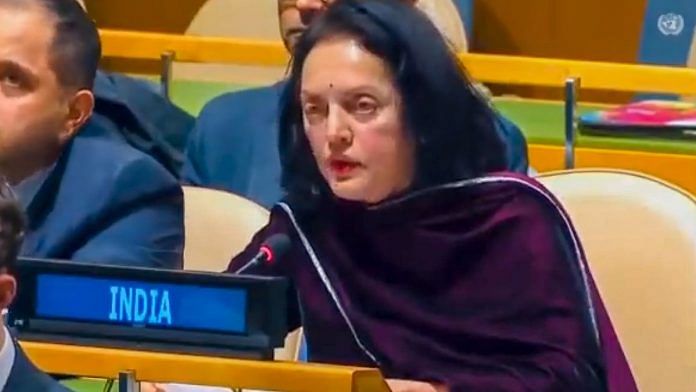New Delhi: As the Russian invasion of Ukraine marked one year Friday, India once again abstained from a vote in the United Nations (UN) General Assembly that called for an end to the war, arguing that the resolution possessed “inherent limitations” and that reports from the ground portray “a complex scenario”.
The UN General Assembly ultimately adopted a non-binding resolution Friday that urged Russia to immediately withdraw its forces from Ukraine and called for a cessation of hostilities.
As many as 141 countries voted in favour and seven — including Russia, Belarus, North Korea, Eritrea, Mali, Nicaragua and Syria — voted against the UN resolution. India, China and Pakistan were among the 32 who abstained.
Experts defended India’s decision, arguing that New Delhi was not a “fence-sitter”. As the president of two key multilateral platforms this year — the G20 and Shanghai Cooperation Organisation (SCO) — India needs to show leadership and consistency in its policies, they added.
In the days leading up to the UN vote, reports emerged that countries like Russia and France were attempting to convince India to shift its position.
“The overall objective of today’s resolution seeking a comprehensive, just and lasting peace in line with the UN Charter is understandable…However, reports from the ground portray a complex scenario, with the conflict intensifying on several fronts,” said Ruchira Kamboj, India’s Permanent Representative to the UN.
She further argued that since the resolution posed limitations, India was “constrained to abstain”.
The decision also comes days before the G20 Foreign Ministers Meeting to be held in New Delhi and attended by the likes of US Secretary of State Antony Blinken and Russian Foreign Minister Sergei Lavrov.
Also read: Amid US-Russia tensions over Ukraine, India to host Antony Blinken, Sergey Lavrov at G20 meet
‘Not a fence-sitter’
Experts, meanwhile, have agreed that India’s decision was a necessary continuation of its strategy to not directly criticise Russia and abstain from such resolutions in the UNGA and UNSC. The decision also comes as India continues to import large amounts of Russian crude, clocking 1.2 million barrels per day, according to data from the month of December 2022.
Speaking to ThePrint, former ambassador Vishnu Prakash said, “India is not a fence sitter. The decision to abstain is a reiteration of our independent and principled stand that the conflict can only be resolved through diplomacy and dialogue.”
He also described the resolution as “one-sided”.
“They urge peace when there is no willingness from either side to engage in meaningful discussions. This was evident in the recently-held Munich Security Dialogue where there was mostly a mindset on how to defeat Russia rather than engage with it,” he added.
The 59th Munich Security Conference took place from 17-19 February in Germany. No Russian officials were invited.
According to Vijay Nambiar, a former ambassador who once served as ex-UN Secretary General Ban Ki-moon’s chief of staff, it was necessary for India to show leadership and consistency in its foreign policy, given it is in a leadership role in two multilateral groups.
“In the days leading up to the vote, there were some European countries who were trying to cajole India onto their side but it was never going to work,” Nambiar said. “India needs to show leadership and consistency in its own policy, especially while holding the G20 and SCO presidencies,” he added.
India took over the one-year G20 presidency last December which will culminate in the 2023 G20 Summit in New Delhi. India also took over the rotating chair of the SCO and will host the SCO Summit this year.
Also read: What US, Taiwan’s ‘Chips Acts’ mean for India’s ambitions in the semiconductor sector



